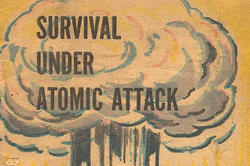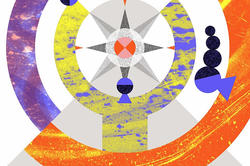RISD’s Center for Complexity launches Horizon 2045, a 25-year project aimed at eliminating the threat of nuclear war.
Closing the Healthcare Gap

Since RISD launched the Center for Complexity (CfC) in 2018, Director Justin Cook and his team of researchers have been applying RISD’s unique collaborative design approach to thorny problems central to the college’s mission and values. Given RISD’s commitment to social equity, Cook notes, “we’re applying an equity lens to the issues we’re working on and using it to drive innovation.”
One such issue is a systemic, nationwide lack of healthcare equity, which manifests as a gap between the morbidity rates of people of color and those of white patients. Last summer the CfC joined the Health Equity Collective, a collaborative working group focused on health justice funded by the Robert Wood Johnson Foundation that seeks to “disrupt and transform systemic racism and other forms of oppression that perpetuate structural inequities for people working within and engaging with healthcare institutions.” Design firm IDEO hosted a series of virtual gatherings over the past year and charged participants with creating and testing a suite of prototypes focused on different aspects of the problem.

“Through our own studio process, we developed an ecosystem of interventions focused on the morbidity and mortality conference, or MMC, as the center of an initiative to advance health equity and reduce adverse medical outcomes,” says CfC Strategic Design Lead Sahib Singh. MMCs, he explains, are a 100-year-old practice within the healthcare industry intended to examine and reduce instances of medical error. But, as CfC Program Coordinator Julie Woods points out, “they frequently take a negative, punitive approach, and the systems and checklists that have been used for years are rarely reexamined.”
“We developed an ecosystem of interventions focused on the morbidity and mortality conference, or MMC, to advance health equity and reduce adverse medical outcomes.”
So, how might the MMC be redesigned to promote health equity, communication, compassion and patient agency? After consulting with numerous healthcare practitioners, the team determined that taking shortcuts when making decisions under pressure is one of the key factors in causing inequities and adverse outcomes. Another is omitting the perspectives of the patient, their family and other nonmedical personnel.
“Our goal was to deeply interrogate what is and bring that together with what could be,” Singh says. “We proposed new structures and guardrails—such as incentives, regulations, policies and agendas—that would promote equity and overcome an industry-wide resistance to change.”

An improved MMC might begin with an exercise the CfC adopted that is used to test for implicit biases, which can potentially influence shortcuts in clinical decision-making and lead to blind spots in post-mortem analyses. Participants are asked to examine Unexpected Visitors, a 19th-century painting by Russian artist Ilya Repin, and then speculate about who the visitor might be and what his relationship is with the other people pictured.
“This project seems to be exactly the right vehicle for putting RISD’s anti-racist principles into practice.”
The team presented their findings to the larger group in March and is looking for opportunities to test their proposed MMC in the coming months. “Working with the Health Equity Collective has been an amazing experience,” says Cook. “The backdrop to the group’s launch was the summer of the Black Lives Matter-led George Floyd protests, so these issues felt powerfully relevant. This project seems to be exactly the right vehicle for putting RISD’s anti-racist principles into practice.”
—Simone Solondz
April 30, 2021


